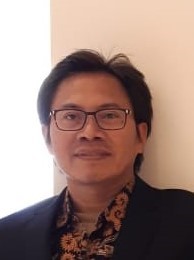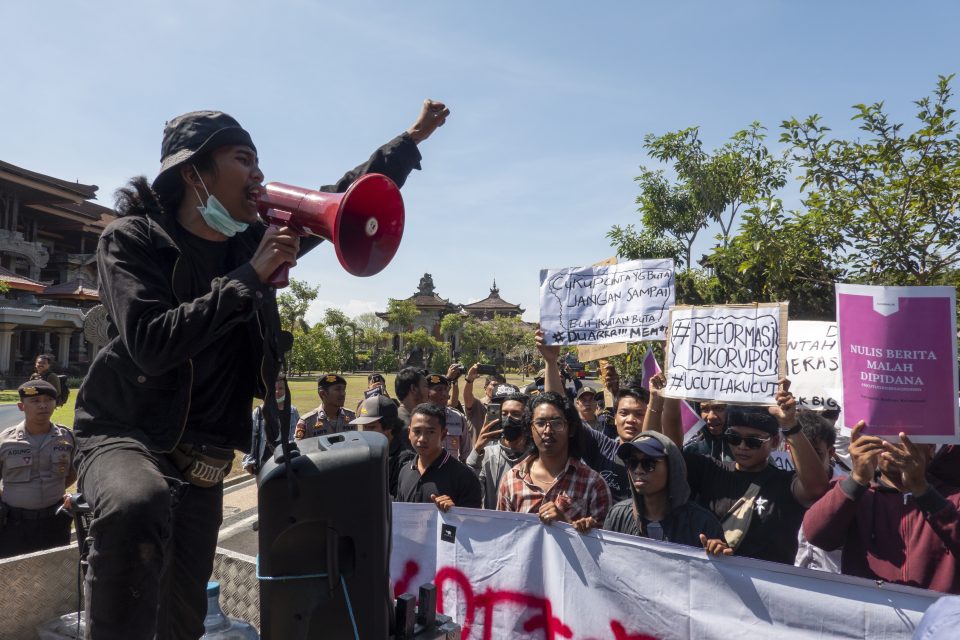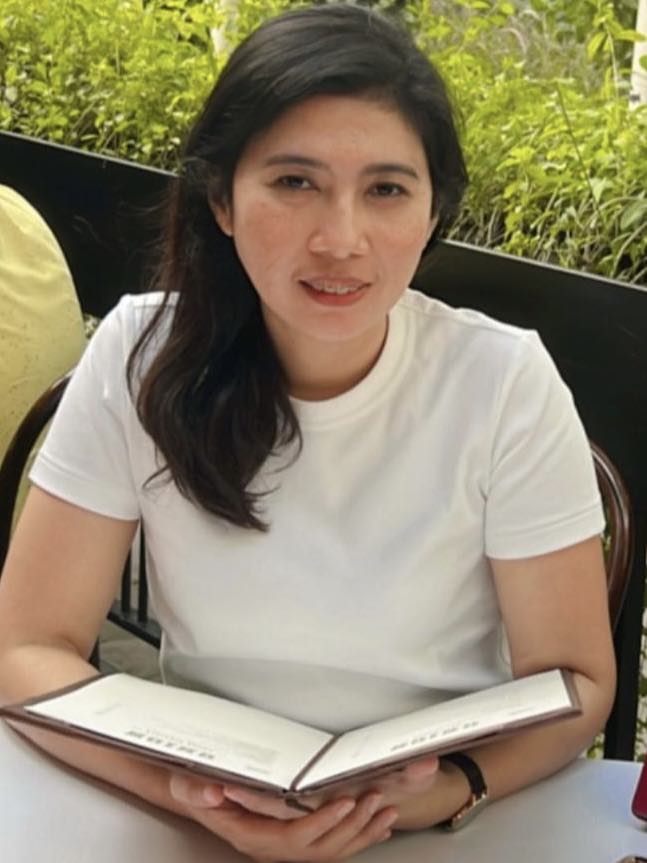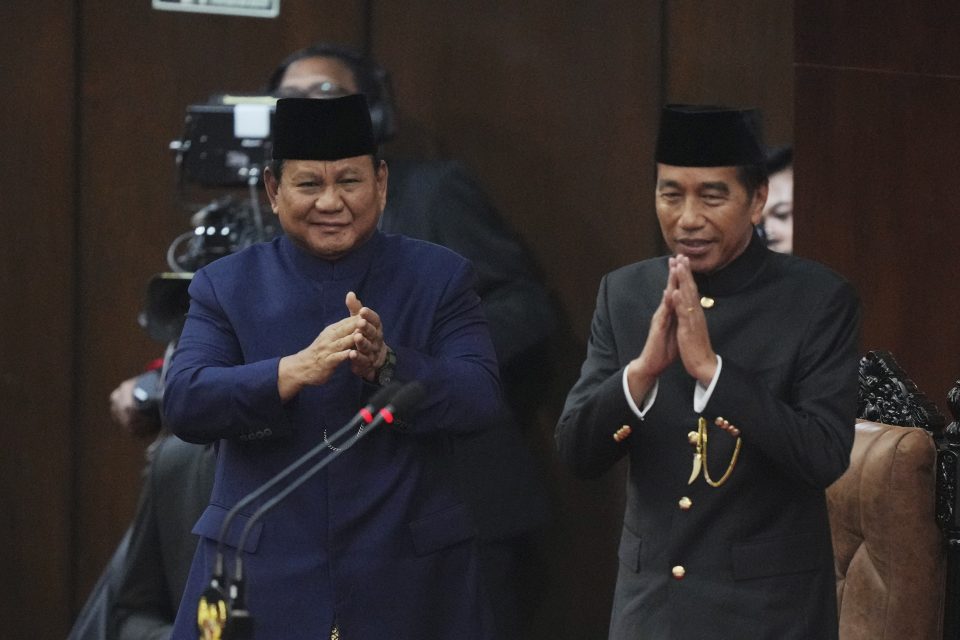The rise and fall of fighting corruption in Indonesia
Asia Journalist Association (AJA), founded in 2004, is an international journalist association that operates under the motto of “One Line of Truth through Sweat and Blood” with the goal of fair reporting, protecting freedom of the press, and developing journalism. To commemorate its 20th anniversary, AJA is sharing special feature articles that look back on the association’s 20-year history and key events within the last 20 years in AJA member countries. THE AsiaN, an outlet based on the AJA network, is reporting 10 special articles marking the 20th anniversary of the founding of AJA every Tuesday and Friday starting April 15, 2025. – Editor’s note
Contributors for AJA Southeast Asia : Norila Daud (Malaysia), Sophal Chhay (Cambodia), Abdul Manan (Indonesia), Elitha Evinora (Indonesia)

JAKARTA: Corruption is an acute problem inherited from the New Order government under Soeharto (1966-1998). Being in power for a long time made power centralized in the figure of the former general. The vortex of corruption and its actors were also around people close to the President.
Soeharto resigned on May 21, 1998 following massive protests led by students. The highest state institution, the People’s Representative Council (MPR), issued MPR Decree Number 11 of 1998 which mandated his successor to overcome the chronic problem of corruption.
The fall of Soeharto and the arrival of the reform era after May 1998 created a climate that supported the growth of democracy, decentralization and a culture of accountability among state administrators.
The intention to combat corruption, at least initially, was what led to the birth of Law Number 31 of 1999 concerning the Eradication of Criminal Acts of Corruption, which later became the basis for the birth of the Corruption Eradication Commission (KPK).
The birth of a special institution to handle corruption, through Law Number 30 of 2002, showed the need for an independent institution that specifically handles corruption. This was also an acknowledgment of the inability of two law enforcement institutions to handle corruption: the National Police and the Attorney General’s Office.
The 1998 Reformation gave birth to a number of important advances for the country, including a more democratic political system. However, the change from the New Order to the Reformation Era did not automatically end a number of bad state practices, including corruption.
Unlike before, corruption was no longer monopolized by people close to the president.
Not long after its birth, the KPK showed its fangs, among others by conducting sting operations on corruption perpetrators, from law enforcement personnel, judges, politicians, and ministers. Since the establishment of the KPK, at least six ministers, one police general, 274 members of the DPR and DPRD have been arrested by the KPK for corruption cases.
This bold step by the KPK gives hope that this chronic disease of the nation can be fought. In 2019, for example, Indonesia’s Corruption Perception Index (CPI) score was at 40, placing it in 85th position out of 180 countries studied by Transparency International.
However, not everyone is happy with what the KPK has done and tried to dampen or silence it. A number of ministers from the Joko Widodo government have on several occasions considered the KPK’s operation to arrest corrupt officials to be disruptive to development and not supportive of the investment climate.
When the KPK arrested the Head of the Traffic Corps, Inspector General Djoko Susilo in 2012 and named Commissioner General Budi Gunawan as a suspect of corruption case in 2015, there was retaliatory action from the Police by criminalizing the KPK commissioner.
The suspect determination made Budi cancel his position as Chief of Police, but he then became Head of the State Intelligence Agency (BIN) during the Joko Widodo administration and Coordinating Minister for Politics, Law and Security during the Pabowo Subianto era.

When the KPK was under pressure, the public and civil society gave their support to the KPK. However, a greater threat came from the government and the DPR, through the revision of the KPK law. The public supported the KPK with a large demonstration at the DPR building in Jakarta in September 2019. The government and DPR ignored the protests and still passed the revised KPK Law on September 17, 2019.
The revised law drastically changed the face of the KPK. By placing it under the government, the KPK lost its independence, making it more vulnerable to intervention. The government and DPR also wanted the KPK to do more prevention than action, indicating that it should not be as aggressive in arresting corruption perpetrators as in the previous period.
The second period of Joko Widodo’s administration (2019-2024) marked the end of the era of an independent KPK. Hopes for this institution that was once feared by corruptors have faded. The KPK’s posture after 2019 has made it very easy to intervene and use it as a tool to hit the government’s political opponents. In 2024, Indonesia’s CPI score plummeted to 34 and its position dropped to 115th out of 180 countries.
The history of the presidential election and the beginning of the emergence of Susilo Bambang Yudhoyono (SBY)

JAKARTA: Reformation in Indonesia produced Susilo Bambang Yudhoyono (SBY), Jokowi, and Prabowo as Presidents. How did they meet on the Indonesian political scene? Here are the answers
Direct Presidential Elections where people can vote for the president and vice president candidates they want and idolize is something very new in Indonesia.
Why new? Because prior to 2004, the President and Vice President of Indonesia were elected by the People’s Consultative Assembly (MPR), Indonesia’s highest body, whose duties include enacting and amending the Constitution and inaugurating the president and vice president. However, during the New Order era (1966-1998), the MPR even had the power to set the Guidelines for State Policy (GBHN).
The year 2004 was a new chapter for the Indonesians, as the first presidential election started with the result of this democratic party being Indonesia’s 6th President Susilo Bambang Yudhoyono and Vice-President Jusuf Kalla.
It is called a new history because since 1955, Indonesians have not been able to elect the leaders they want. However, the process of electing the president and the vice by the MPR was still called the Presidential Election.
The Direct Presidential Election is the fruit of reformation that happened from 1998 to 2004. The reformation occurred because in 1997, Indonesia began to experience a monetary crisis that caused economic conditions to decline and lead to the vast public dissatisfaction.
This dissatisfaction grew and massive demonstrations were held by students from various universities asking the then incumbent president, Soeharto, to step down from office.
Soeharto’s leadership, which was no longer trusted at all, eventually led to a new era of leadership in Indonesia called the reformation period.
It produced new leaders after Soeharto’s 32 years in power (1966–1998). They were BJ Habibie, Abdurrahman ad-Dakhil aka Gus Dur, Megawati Soekarnoputri, and Susilo Bambang Yudhoyono (SBY) who were appointed based on the results of the MPR Special Session.
The history of presidential and vice-presidential elections began with the third amendment of the 1945 Constitution in 2001. Article 6A (1) of the Constitution states that the president and vice president are directly elected by the people.
From this amendment, Megawati Soekarnoputri, who was then President of the Republic of Indonesia, signed Law Number 23 Year 2003 on the Election of the President and Vice President.
Article 5 Paragraph (4) of the Law states that the presidential and vice-presidential candidates can only be nominated by a political party or a coalition of political parties that obtains at least 15 percent of the total seats in the House of Representatives (DPR) or 20 percent of the national valid votes in the DPR elections.
Article 66 Paragraph (2) of the Election Law states that a presidential and vice-presidential candidate pair is declared victorious or elected if they get more than 50 per cent of the total votes in the election with at least 20 percent of the votes in each province spread across more than half of the provinces in Indonesia.
The decision finally brought together five pairs of presidential and vice- presidential candidates, namely Wiranto-Salahuddin Wahid, Megawati Soekarnoputri-Hasyim Muzadi, Amien Rais-Siswono Yudo Husodo, Susilo Bambang Yudhoyono-Jusuf Kalla, and Hamzah Haz-Agum Gumelar.
Although it was formed by Megawati Soekarnoputri, 2004 was a historical moment for Indonesia because the Direct Presidential Election produced new leaders in Indonesia, Susilo Bambang Yudhoyono and Jusuf Kalla.
Susilo Bambang Yudhoyono sat in the presidency for 2 periods (10 years). And during that time, new names emerged and sank during the presidential election such as Joko Widodo and finally Prabowo Subianto. How did these three names meet?
The emergence of the names Prabowo Subianto and Joko Widodo
Prabowo Subianto’s presence is controversial because he is the son-in-law of President Soeharto, a president who was ousted because he was considered a dictatorial leader.
In addition, at the end of President Soeharto’s regime in power, Prabowo also held the position of Pangkostrad (Commander of the Army Strategy Command). This position came down with the fall of the Soeharto era due to the unstoppable rage of demonstrators in Indonesia.
However, Prabowo’s ouster was apparently carried out by his own father-in-law, Soeharto, who asked the newly elected president, BJ Habibie, to remove his son-in-law.
Prabowo was recorded as being married to Titiek Soeharto in 1983. Their marriage only lasted 15 years. Rumour has it that the divorce, which took place in May 1998, happened because Prabowo betrayed Soeharto. The year 1998 was a dark period in Indonesia where the whole world recorded massive riots in Jakarta, the capital of the country.
Prabowo Subianto’s name first appeared in the Presidential Election when he ran as the Indonesian presidential candidate from the Golongan Karya (Golkar) Party at the Golkar Presidential Candidate Convention in 2004. Unfortunately, he was defeated by Wiranto, a retired Indonesian National Army (TNI) officer.
Not wanting to give up, Prabowo again tried his luck to run as a presidential candidate in the 2009 Presidential Election. A fierce debate took place at that time because it was recorded that Prabowo Subianto finally only ran as a vice-presidential candidate to accompany Megawati Soekarnoputri.
For the third time, Prabowo ran in the 2014 Presidential Election by partnering with Hatta Rajasa as his vice president candidate. Unfortunately, he had to swallow another bitterness as he lost to Joko Widodo who was paired with Jusuf Kalla.
The fourth time, in 2019, Prabowo tried his luck again by partnering Sandiaga Uno, a businessman, to defeat Joko Widodo who was paired with Maaruf Amin.
History records that Prabowo lost and the presidency was again occupied by Joko Widodo for two terms.
Despite the defeat, Prabowo was given the position of Minister of Defence in the Indonesia Maju Cabinet formed by President Joko Widodo in 2019–2024.

Prabowo Subianto finally wins
Prabowo Subianto finally managed to reach the presidential seat in the 2024 Presidential Election. Together with Gibran Rakabuming Raka, Joko Widodo’s son, he won the election with 58.59 votes nationally.
This victory is quite surprising because after trying to participate in the presidential election four times, Prabowo finally won with the help of Joko Widodo’s strategy.
This seems to repeat the success of Joko Widodo who started his career as Mayor in Solo, Central Java. He was leading the city only for 2.5 years before finally participating as Governor of DKI Jakarta upon the request of his party, the Indonesian Democratic Party of Struggle (PDIP), he told the media.
He served as governor of DKI for two years, because he decided to participate in the 2014 Presidential Election.
Jokowi was fortunate enough to have his popularity and political prowess propel him as President of Indonesia for two terms.
He did manage to topple the PDIP Party by leaving the party after his presidency. Jokowi’s entire family, including his son who is currently the Vice President of Indonesia, were also taken out of the party.
The clash between Jokowi and PDIP has often been heard by the media since his tenure as Governor of DKI. His skillful hand seems to have succeeded in seating Prabowo Subianto as the 8th President of the Republic of Indonesia.
(To be continued)
Related Articles : Asia Journalist Association 20th anniversary special feature articles – THE AsiaN
AJA born of a meeting of minds – THE AsiaN
AJA and My Seven Sojourns in Korea – THE AsiaN
“A bridge connecting Asia and the world, AJA’s journey is ongoing” – THE AsiaN
AJA: An Open Community Beyond Borders and Cultures – THE AsiaN
More freedom and movements towards greater democracy in Malaysia – THE AsiaN
Cambodia Hosts First-Ever Regional Games in History – THE AsiaN
The rise and fall of fighting corruption in Indonesia – THE AsiaN
Political instability brought about by the first political revolution – THE AsiaN
Uzbek President delivers historic speech in native language at the 2023 UN General Assembly – THE AsiaN
Georgia in its existential struggles for the last twenty years – THE AsiaN
